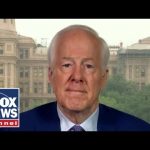In a recent discussion on Fox News Sunday, Treasury Secretary Scott Besson addressed the vital issue of immigration reform and its impact on the U.S. economy. In an op-ed piece for Fox News, Besson emphasized that ending illegal immigration could potentially redirect $249 billion in annual wages from undocumented workers to legal workers and American citizens. This, he argues, is not just a matter of fairness but could also lead to significant wage increases for the American working class.
Besson pointed out that the flood of illegal immigration over the past couple of decades has consistently suppressed wages for American workers. He straight-up called it a “big lie” that this influx didn’t harm working-class wages. Instead of promoting prosperity for all, he suggests that current policies have allowed Wall Street to thrive while neglecting Main Street. With the proposed changes, he hopes to see a future where both sectors can flourish together, leading to a brighter economic outlook for everyday Americans.
However, skeptics quickly raise concerns about whether American workers will step up to fill jobs that may open up once illegal immigration is curtailed. Some reports indicate that the labor market isn’t overflowing with idle Americans anxious to take those positions. Despite these claims, Besson remains optimistic. He believes that if wages increase, U.S. workers will be more inclined to take on these jobs. Many young men, particularly those aged 16 to 35, are struggling with their circumstances, and Besson is hopeful that they will return to the workforce when better-paying opportunities arise.
Switching gears, the conversation also touched on tariffs as the deadline for new trade agreements approached. President Donald Trump has been vocal about enforcing new tariffs if certain trade partners can’t reach a fair deal by August 1. Besson highlighted that the pressure created by these negotiations is necessary to encourage progress and that the U.S. holds considerable leverage due to its large economy. He noted that many trading partners may need to rethink their positions given that the U.S. is a significant deficit country relying on imports.
Despite concerns from economists and a significant part of the public regarding the impact of tariffs on inflation and consumer costs, Besson asserted that the narrative surrounding these tariffs is often skewed. He pointed out that many manufacturers might absorb some of the tariff costs to maintain their market position, minimizing the direct impact on consumers. Besson dismissed the notion that inflation would arise from these measures, instead suggesting that most businesses have already adapted to the economic climate without drastic price hikes.
Throughout the discussion, Besson projected a strong confidence in the administration’s handling of economic policy, leaving viewers with a sense of optimism about the future. He portrayed a vision in which improved wages and economic stability could lead to a more robust and equitable job market for all Americans. Whether or not consumers and workers will agree remains to be seen, but one thing is sure—these discussions about immigration reform and trade are far from over, and they are set to take center stage in the political arena in the coming months.




